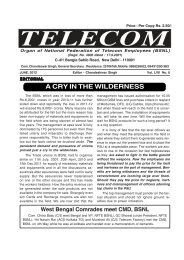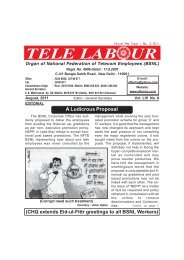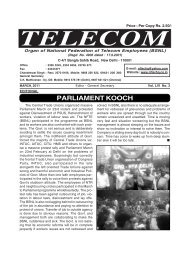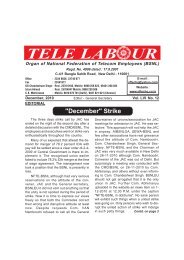Create successful ePaper yourself
Turn your PDF publications into a flip-book with our unique Google optimized e-Paper software.
the leaders or on other extraneous considerations<br />
is downright subjectivism and<br />
bureaucratism.<br />
The concept of the TU movement is not<br />
that which is in the mind of few leaders,<br />
but the which is in the conscious of broad<br />
mass of workers who have been won for<br />
the struggle.<br />
The TU functionary must neither run<br />
ahead of masses nor lag behind. This he<br />
can learn only by experience and study, by<br />
being in close touch with the masses.<br />
Sometime he has to restrain the inexperienced<br />
masses. At other times he has to<br />
rouse them into correct action.<br />
Whatever be the form of the strike (one<br />
day/indefinite), it has to be thoroughly prepared,<br />
properly organized, and must rely<br />
on the general solidarity of the workers of<br />
a given trade, and on their moral and<br />
material support.<br />
Before calling a strike, explore all avenues<br />
of settlement. Be prepared for negotiations<br />
when the proper opportunity presents<br />
itself. Do not hesitate to launch it, after negotiations<br />
fail or if employers refuse to negotiate.<br />
Do not violate obligatory legal procedures.<br />
Do not close the door for talks or mediation<br />
efforts when the situation demands<br />
it. Do not expose all the key cadres. When<br />
the mood of the workers justifies retreat, do<br />
not hesitate of call off. On the other hand do<br />
not panic and call it off for fear of repression<br />
or apprehending defeat.<br />
Due to historical reasons, the TU movement<br />
is sharply divided and fragmented.<br />
The split and the top reaches right down to<br />
the bottom. Rivalry at the plant level often<br />
induces a sort of competition in<br />
economism. It leads to attempts at undercutting<br />
each other, sometimes to the point<br />
of physical violence and needles industrial<br />
actions. At major industrial centers Tu<br />
bosses and Dadas have sprung up. Even<br />
in the field of joint actions, efforts are often<br />
made to outsmart each other and appear<br />
to be on top. Inter-union rivalry greatly<br />
hampers the ability of workers to organize<br />
effective broad actions against management<br />
and the government.<br />
The most distressing picture is where rival<br />
unions each of them flying RED FLAG,<br />
and swearing by socialist ideology, each of<br />
them calling for Tu unity, in actual practice<br />
keep the workers divided. This only confuses<br />
workers, and delays their consolidation as a<br />
class.<br />
The slogan of one union in One Industry<br />
has to be popularized as the goal of Tu unity<br />
at the grass-root level, even if this does not<br />
appear to be immediately realizable. The fact<br />
cannot be ignored that workers are fed up<br />
with the existence of multiple unions.<br />
Discussions have to be initiated to work<br />
out a CODE OF CONDUCT for Eliminating<br />
Rivalries, doing away with attempts to undercut<br />
each other and for ensuring<br />
democratic functioning. Also for removing<br />
irritants in joint work, and for putting a stop<br />
to physical Clashes. The struggle for unity<br />
is a complex task. It calls for patience and<br />
perseverance.<br />
The call for TU unity is not a routine slogan.<br />
It is not a tactical manoeuvre, meant to<br />
score points over other. It is of vital interest<br />
for the working class.<br />
(Excerpts from pages of Lecture Notes: TU<br />
Education)<br />
Tele Labour 7 July, 2012







